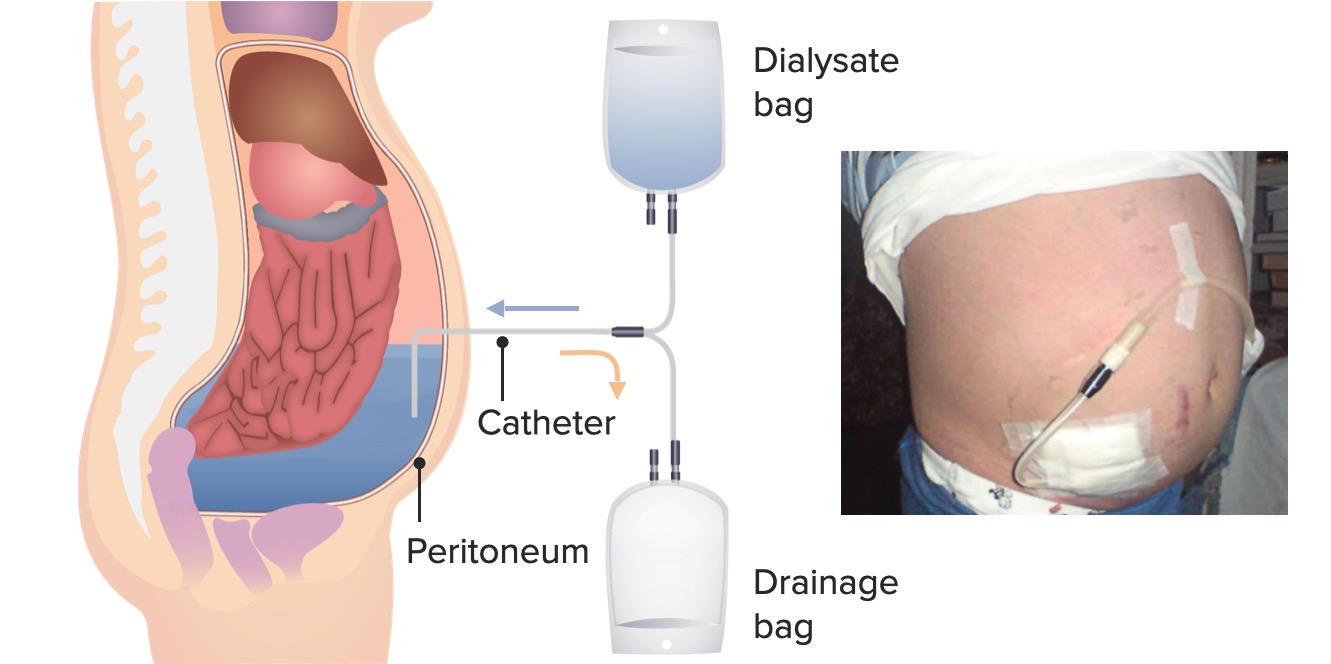Playlist
Show Playlist
Hide Playlist
Renal Replacement Therapy: Types
-
Slides Renal Replacement Therapy.pdf
-
Reference List Nephrology.pdf
-
Download Lecture Overview
00:01 Let's look at these a little bit more closely. 00:03 Again, I'm going to say that we've got hemodialysis that's blood dialysis. 00:07 So that means that we are hooking our patient up to a machine. 00:11 We are actually taking their blood, and we are running it through an extracorporeal circuit through a dialyzer, cleaning that blood and essentially returning that cleaned blood back to the patient. 00:23 We've got peritoneal dialysis. 00:26 So this is actually really cool where we use the peritoneum as a dialyzer. 00:31 So we can take advantage of that and do dialysis through having fluid instilled into that peritoneal cavity and then removing that fluid. 00:40 And then finally, that golden opportunity transplant, which is what most of us strive to have each patient have available to them. 00:47 So under hemodialysis, there's a couple of different variants that we have available to our patients. 00:52 They can do what we call in-center dialysis. 00:54 Meaning that a patient is coming from home to a center where there are nurses and technicians that can do the dialysis for the patient. 01:02 And this comes in a few different varieties. 01:05 You can do thrice weekly dialysis, where they're going to a center and they're spending maybe four hours at a time three times a week at that center, or my very favorite, which is nocturnal dialysis in-center. 01:18 So that means patients come to dialysis at 9 o'clock at night. 01:22 They sleep through their dialysis, they wake up at five o'clock in the morning and they're on for the rest of their day to go to work, or go to school, or do whatever they want. 01:30 It's a longer dialysis period of time, but the dialysis is slower, and oftentimes patients will feel better. 01:37 There's also home dialysis or home hemodialysis that our patients can do. 01:42 This includes short daily dialysis, that means that patients are actually dialyzing six times per week about two to three hours at a time. 01:50 They get to do this within the comfort of their homes. 01:52 They could be reading a book, they could be reading the paper, they can be studying. 01:56 They can do nocturnal home dialysis, so they're sleeping in their own bed and doing dialysis overnight anywhere from six to eight hours. 02:03 And they can do conventional dialysis where they have more of a conventional machine and they're doing four hour dialysis, thrice weekly. 02:10 We also have peritoneal dialysis that we talked about. 02:13 And again, this is really kind of a neat phenomena, If you think about our own body, our peritoneal cavity, actually can be used as the dialyzer. 02:21 So we instill fluid into the abdomen, and then we take that fluid out. 02:25 And people can do this in an ambulatory setting, meaning that they're manually putting that fluid in. 02:30 So they might put some fluid into their belly, leave that in for four hours, they drain that manually, and they put more fluid in and they do that throughout the day. 02:38 That's referred to as continuous ambulatory peritoneal dialysis. 02:43 And they can also have an automated peritoneal dialysis. 02:46 That means that patients might work during the day they come home at night, they hook up to a machine and the machine actually is what instills the fluid in the peritoneal cavity. 02:57 And then releases the fluid, instills and releases and do their dialysis overnight. 03:02 They wake up the next morning, ready to go. 03:04 And then finally, we have transplant. 03:07 Transplant again, is that golden opportunity that I think most nephrologists will strive to have their patients have available to them. 03:15 We'll talk a little bit more about that in the next coming slides.
About the Lecture
The lecture Renal Replacement Therapy: Types by Amy Sussman, MD is from the course Renal Replacement Therapy.
Included Quiz Questions
What is the advantage of nocturnal in-center hemodialysis?
- Better quality of life
- Flexible schedule
- Once-weekly treatments
- Faster dialysis process
Which type of renal replacement therapy has the best long-term outcomes?
- Renal transplant
- Home hemodialysis
- In-center hemodialysis
- Peritoneal dialysis
Customer reviews
5,0 of 5 stars
| 5 Stars |
|
5 |
| 4 Stars |
|
0 |
| 3 Stars |
|
0 |
| 2 Stars |
|
0 |
| 1 Star |
|
0 |




